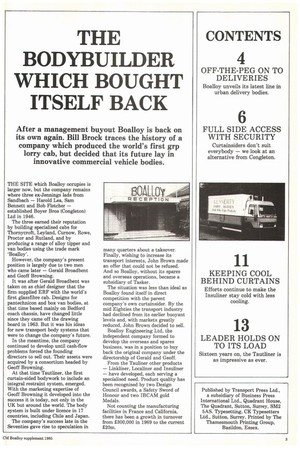THE BODYBUILDER WHICH BOUGHT ITSELF BACK
Page 49

If you've noticed an error in this article please click here to report it so we can fix it.
After a management buyout Boalloy is back on its own again. Bill Brock traces the history of a company which produced the world's first grp lorry cab, but decided that its future lay in innovative commercial vehicle bodies.
THE SITE which Boalloy occupies is larger now, but the company remains where three ex-Jennings lads from Sandbach — Harold Lea, Sam Bennett and Bob Fletcher — established Boyer Bros (Congleton) Ltd in 1946.
The three earned their reputation by building specialised cabs for Thornycroft, Leyland, Curnow, Rowe, Proctor and Rutland, and by producing a range of alloy tipper and van bodies using the trade mark 'Boalloy'.
However, the company's present position is largely due to two men who came later — Gerald Broadbent and Geoff Browning.
It was after Gerald Broadbent was taken on as chief designer that the firm supplied ERF with the world's first glassfibre cab. Designs for pantechnicon and box van bodies, at that time based mainly on Bedford coach chassis, have changed little since they came off the drawing board in 1963. But it was his ideas for new transport body systems that were to change the company's future.
In the meantime, the company continued to develop until cash-flow problems forced the founding directors to sell out. Their assets were acquired by a consortium headed by Geoff Browning.
At that time Tautliner, the first curtain-sided bodywork to include an integral restraint system, emerged. With the marketing expertise of Geoff Browning it developed into the success it is today, not only in the UK but around the world. The body system is built under licence in 17 countries, including Chile and Japan.
The company's success late in the Seventies gave rise to speculation in many quarters about a takeover. Finally, wishing to increase its transport interests, John Brown made an offer that could not be refused. And so Boalloy, without its spares and overseas operations, became a subsidiary of 'Frisker.
The situation was less than ideal as Boalloy found itself in direct competition with the parent company's own curtainsider. By the mid Eighties the transport industry had declined from its earlier buoyant levels and, with markets greatly reduced, John Brown decided to sell.
Boalloy Engineering Ltd, the independent company formed to develop the overseas and spares business, was in a position to buy back the original company under the directorship of Gerald and Geoff.
From the Tauliner other products — Linkliner, Localiner and Insuliner — have developed, each serving a specialised need. Product quality has been recognised by two Design Council awards, a Safety Sword of Honour and two IBCAM gold Medals.
Not counting the manufacturing facilities in France and California, there has been a growth in turnover from £300,000 in 1969 to the current £20m.












































































































